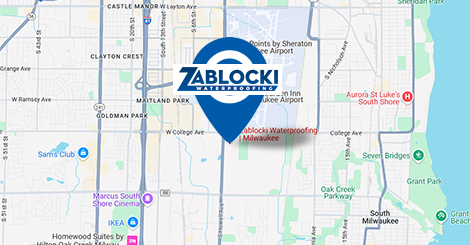If you’re in the market for a new home, you may be wondering if you should buy one with bowing basement walls. This is definitely not an ideal situation, but it’s important to know what your options are before making a decision. In this blog post, we will discuss what bowing basement walls mean and how to address them. We’ll also talk about the causes of basement wall bowing and how to prevent it in the future.
Article Summary:
- What Are Bowing Basement Walls?
- Causes of Bowing Basement Walls
- Addressing Bowing Basement Walls
- How Can I Prevent My Basement Walls From Bowing?
- What Should I Do if I Want to Buy a Home With Bowing Basement Walls?
- Milwaukee Basement Waterproofing Options
1. What Are Bowing Basement Walls?
Bowing basement walls is not something you want to see when you’re considering buying a new home. But what exactly does it mean?
Bowing occurs when the weight of the house above starts to push down on the walls below, causing them to bow or curve inward. A very small amount of bowing may be due to the normal settling of a home over time, but bowing more than two inches inward indicates a serious problem that needs to be addressed right away.
If you’re concerned that the basement walls in a home you’re considering purchasing are bowed, there are a few things you can look for:
- Are the basement walls straight, or do they curve inward?
- Do the doors and windows fit properly, or are they crooked and difficult to open or close?
- Are there cracks in the foundation or floor? Specifically, look for horizontal or diagonal/stepped cracks – these are more severe types of cracks that can lead to bowing.
If you notice any of these signs, it’s important to further investigate the issue and determine the cause. It’s also a good idea to have a professional inspection done before making a decision on buying the home.
2. Causes of Bowing Basement Walls
Bowing basement walls can be caused by various factors, including:
- Poor construction: If the foundation was not built correctly or with the right materials, it can lead to bowing walls.
- Hydrostatic pressure: This is caused by water buildup around the foundation, and over time, it can push against the walls and cause them to bow inward.
- Tree roots: If there are large trees planted near the house, their roots can grow into the foundation and create pressure that causes bowing.
- Soil type: The type of soil around the foundation can also contribute to bowing, as certain types are more likely to expand and create pressure against the walls.
3. Addressing Bowing Basement Walls
If you do find that a home has bowing basement walls, don’t panic. There are ways to address this issue and prevent it from getting worse:
- Reinforcement: Installing steel beams or braces can provide extra support to the walls and prevent further bowing.
- Waterproofing: Fix any issues with water buildup around the foundation, and consider basement waterproofing solutions to prevent future damage.
- Foundation repair: In more severe cases, professional foundation repair services may be necessary. This can involve installing helical piers or other methods to stabilize and strengthen the foundation.
4. How Can I Prevent My Basement Walls From Bowing?
There are a few things you can do to help prevent your basement walls from bowing:
- Make sure your gutters and downspouts are clean and clear, so they can properly drain water away from your foundation.
- Check for any cracks in your foundation or floor, and seal them as soon as possible.
- Install a sump pump in your basement to help remove any water that does accumulate there.
- Make sure the home’s foundation is built correctly and with quality materials.
- Regularly inspect and maintain the foundation for any cracks or signs of bowing.
- Invest in a quality basement waterproofing system.
By being proactive and taking these steps, you can potentially avoid dealing with bowing basement walls in your home in the future. However, if you do encounter this issue, it’s important to address it right away before the issue gets worse. Remember to always consult with a professional for proper evaluation and solutions.
5. What Should I Do if I Want to Buy a Home With Bowing Basement Walls?
Bowing basement walls indicate a serious foundation issue. Most homebuyers consider serious foundation damage a deal breaker when it comes to choosing a home. However, in today’s housing market, you may find yourself seriously considering a home with foundation damage if you love many other things about the home.
If you are looking to purchase a home and notice any signs of bowing basement walls, it’s important to have an expert foundation repair company or foundation inspector come take a look and let you know what you should expect in terms of repair. Bowing basement walls are usually repaired by excavating the soil around the foundation of the home, straightening the wall, and installing wall anchors or steel I-beams to straighten the walls and prevent further bowing. While not the most fun home maintenance project, repairing bowing basement walls is critical to ensuring the safety and lasting structure of a home.
If you want to move forward with purchasing a home with bowing basement walls, it’s important to factor the cost of repair into your overall budget. Depending on the severity of the damage, basement wall repair can run anywhere from $700 – $15,000 or more.
6. Milwaukee Basement Waterproofing Options
A good basement waterproofing system is your best defense against bowing basement walls. Waterproofing your foundation will help to keep water from seeping in and causing damage that can lead to bowing or other foundation issues. Basement waterproofing should be done as soon as you notice any cracks in your foundation, even if they’re small – it’s always better to be proactive when it comes to your home’s foundation!
At Zablocki Waterproofing, we have over 35 years of experience repairing basement walls. We will be able to assess the damage and determine the best course of action. If you have any questions about basement wall repair, foundation repair, or basement waterproofing in Milwaukee, don’t hesitate to contact Zablocki Waterproofing today!






